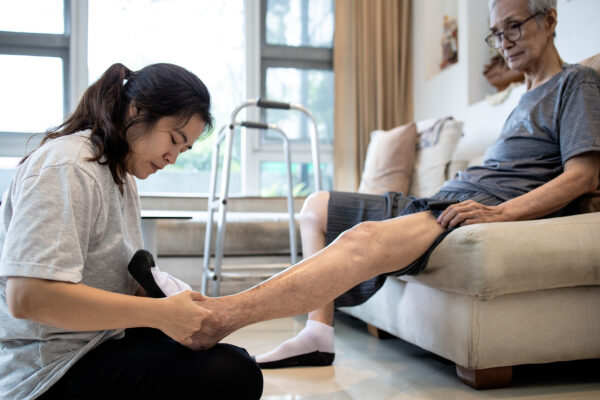December 6, 2024

Psoriasis is a chronic autoimmune illness characterized by an accumulation of skin cells, resulting in scaling, inflammation, and redness. While it affects people of all ages, seniors with psoriasis frequently encounter specific issues that require unique care. Understanding these requirements and the symptoms they may have and ensuring they’re able to manage the condition is key. The good news is that senior home care and loved ones can work together to give seniors the support they need.
Psoriasis can take many different forms, the most common of which is plaque psoriasis. Symptoms include raised, scaly skin patches that frequently occur on the scalp, elbows, knees, and lower back. Seniors may also experience itching, burning, or discomfort. Additionally, psoriatic arthritis is more common among seniors. This inflammatory joint disorder can cause joint discomfort, stiffness, and edema, further impacting seniors’ quality of life.
It’s important to note that psoriasis is frequently associated with other health disorders, including diabetes, hypertension, and cardiovascular disease, which are also more common in seniors. When the two exist at the same time, it can complicate treatment, which requires a more personalized care plan.
The visual form of psoriasis can cause low self-esteem and withdrawal from social activities. Seniors may also encounter age-related stigmas, which increase feelings of loneliness and depression. Addressing these issues is just as crucial as controlling the physical effects. This is one area where senior home care shines, as they offer a built-in connection for seniors.
Unfortunately, psoriasis in seniors is commonly misinterpreted as eczema or another skin disorder due to overlapping symptoms. This isn’t the only complication, however, which is why it’s essential for seniors to have a strong support system, including family members, senior home care, and the medical team. Beyond misdiagnosis, some of the complications that may arise are explored further below:
Polypharmacy: Seniors may already be taking a long list of medications, which raises the risk of drug interactions and reduces their options for treatment.
Fragile Skin: Topical treatments can irritate thinner skin more easily.
Weakened Immune System: Immunocompromised seniors may be more vulnerable to certain treatments, meaning a more detailed plan and monitoring might be needed.
Accessibility Challenges: Seniors on a fixed income may struggle to seek or pay for specialized dermatological care.
Management starts with a combination of medical treatments suited to the senior’s needs:
Topical Therapies: Topical therapies such as corticosteroids can help minimize scaling and irritation. As mentioned, it’s important to use these with caution to prevent further skin thinning.
Systemic Medications: The medical team might consider methotrexate and biologics as options to examine, but their use should be balanced against potential dangers, particularly in seniors with other existing conditions.
Light Therapy: Phototherapy is a non-invasive treatment option that can be successful in seniors, although accessibility may be an issue. It is something they can explore with their medical team, however.
Lifestyle Adjustments: Seniors can also take control of the condition by making certain lifestyle adjustments, and senior home care can help by helping them create healthy meal plans, ensuring they stay hydrated, and encouraging mindfulness activities to reduce stress.
Psoriasis in seniors is a complex condition that requires comprehensive care and a strong support team, including home care, loved ones, and family members. By working together to help seniors manage psoriasis, they can enjoy life that much more.
Sources:
https://www.ocanamedicalcenter.com/psoriasis-in-seniors-best-ways-to-manage-psoriasis
-https://www.hopkinsmedicine.org/health/conditions-and-diseases/arthritis/psoriatic-arthritis
-https://www.aad.org/public/diseases/psoriasis/treatment/stage/65-beyond
-https://my.clevelandclinic.org/health/diseases/22842-plaque-psoriasis